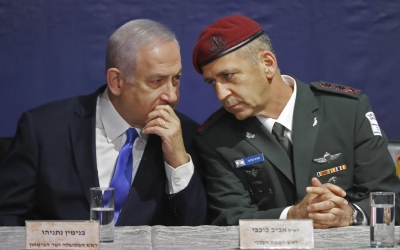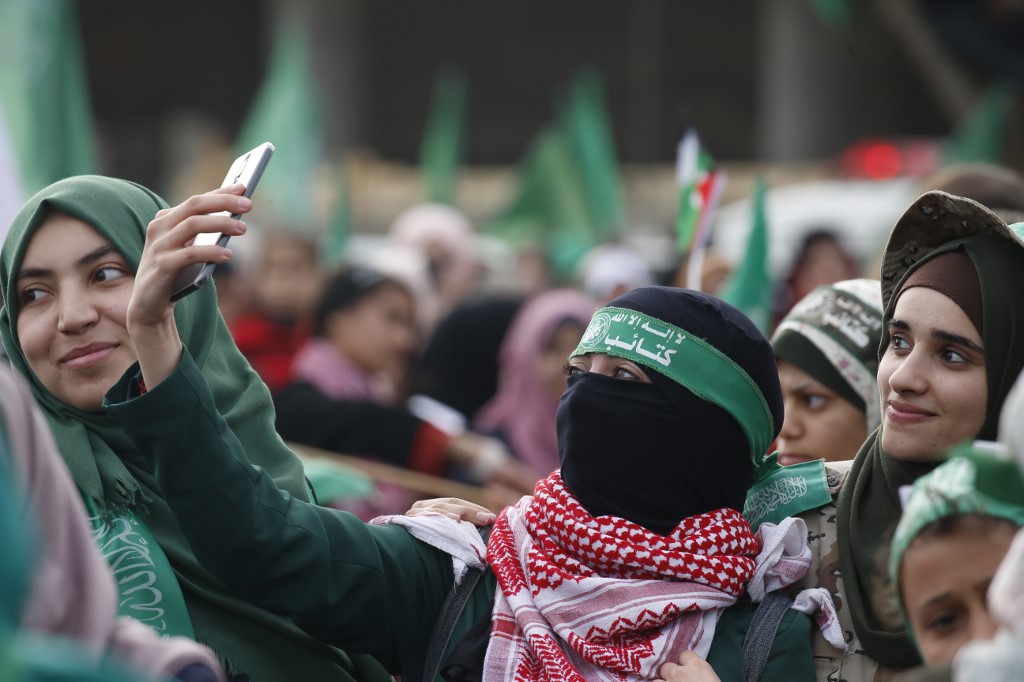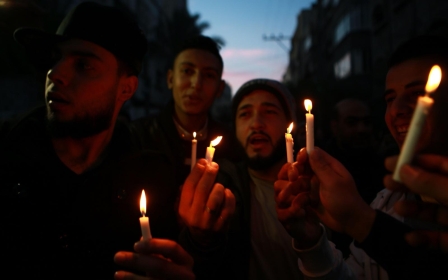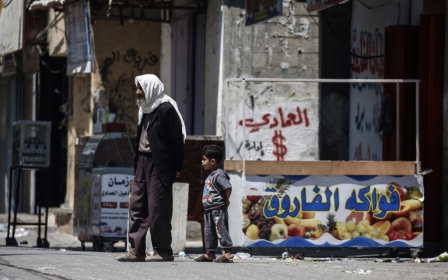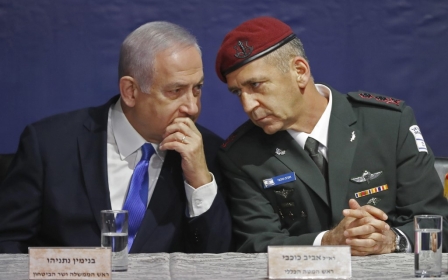'About to erupt': What's behind the attacks across Gaza's frontier?

August has been a deadly month for the besieged Gaza Strip. Since 1 August, Palestinians have carried out a series of attacks on Israeli forces stationed along the separation fence between the Palestinian enclave and Israel.
Nine Palestinians apparently involved in the attacks were killed, while two Israeli soldiers and one commander were wounded.
On Thursday, Israeli planes struck a number of alleged Hamas bases across Gaza, in purported retaliation for rockets fired from the Palestinian territory overnight. Neither the rockets or strikes caused any casualties.
The spike in operations in recent weeks carried out by Palestinians who, while members of armed resistance factions, reportedly acted independently has led to a flurry of speculation.
Particularly in the Israeli media, where commentators have asked whether Hamas has lost control of the situation - 13 years since it won legislative elections and a subsequent power battle, and became the de facto ruling authority in Gaza.
New MEE newsletter: Jerusalem Dispatch
Sign up to get the latest insights and analysis on Israel-Palestine, alongside Turkey Unpacked and other MEE newsletters
While Hamas spokesman Hazem Qassim told Middle East Eye that the situation in Gaza was "under control”, he warned that the small blockaded territory was “like a volcano about to erupt in the face of the Israeli occupation”.
Media speculation
At least nine of the Palestinians killed while carrying out three attacks this month were affiliated to Palestinian resistance groups, mainly Hamas’s military wing the al-Qassam Brigades, but acted in a personal capacity.
The possibility of Hamas losing control in Gaza - where for more than a decade it has been the main political and military actor amid a power struggle with the West-Bank based Palestinian Authority (PA) and a crippling Israeli-led siege - has sparked a flurry of speculation.
For some observers, possible scenarios in which Hamas could lose its grip on Gaza include: an Israeli military offensive leading to a renewed occupation with boots on the ground in the coastal enclave; the PA regaining control of Gaza through either Israeli intervention or an unprecedented breakthrough in long-stalled unity talks; or simultaneous popular and factional pressure against Hamas that could leave Gaza with an unpredictable power vacuum.
For Israeli news outlets, the fact that the recent operations ostensibly took place without Hamas’s knowledge or approval has put the resistance group in a “dilemma”, caught between its responsibility as the territory’s ruling party - including being the leading political interlocutor in any truce efforts - and its mission of resistance against the occupation.
Speaking to Israeli army radio channel, Maariv journalist Jacky Hugi said Hamas has been put in a delicate position due to “unreal promises” to ease the Israeli siege on Gaza.
In May, Israel and Hamas reached a truce agreement stipulating that Israel would expand Gaza’s designated fishing zone to 15 nautical miles; enable UN cash-for-work programmes; allow medicine and other civil aid to enter the besieged enclave; and start indirect talks on matters relating to electricity, boundary crossings, healthcare and Qatari funding to Gaza.
In return, Hamas agreed to restrain the Great March of Return - an ongoing protest movement which has gathered along the separation barrier between Gaza and Israel since March 2018 to call for a lifting of the siege and the implementation of the right of return for Palestinian refugees.
As part of the truce, Hamas agreed to monitor the demonstrations to make sure protesters remain outside of a 300m buffer zone near the fence, stop launching incendiary balloons, as well as put an end to all maritime protests.
Both members of the Israeli army and Israel’s political opposition have blamed Israeli Prime Minister Benjamin Netanyahu for losing deterrence against Gaza and call for a major offensive in the Strip to stop the intermittent rocket fire and infiltration attempts. But Netanyahu and his ruling party, Likud, have been seemingly more hesitant to push for war mere weeks before legislative elections.
Hugi argued that supporters of Palestinian resistance groups have not felt any improvements on the ground since the truce was agreed upon - and were therefore turning against Hamas.
As a matter of fact, many Palestinians in Gaza have grown increasingly angry at the lack of implementation of Israel’s side of the bargain, with large crowds at the latest funeral for three slain Palestinian fighters seeming to confirm that Hamas is losing some degree of popular support in the besieged territory.
Propaganda war
But for Qassim, the Hamas spokesman, the narrative pushed by Israeli media in the past month about Hamas’s loss of popularity in Gaza has been grossly exaggerated.
Israeli news outlets, Qassim said, have been “highlighting issues which are not real or have nothing to do with issues on the ground in order to cover up the Israeli crimes against Palestinian holy sites”.
For veteran Palestinian journalist Mustafa al-Sawwaf, claims of Hamas losing control over the Gaza Strip are implausible given the “strong coordination” of different Palestinian factions.
“Consensus and unity of Palestinian resistance factions through the Joint Operation Room prevents entering any unplanned confrontation with the Israeli occupation,” he told MEE.
As a result, Sawwaf hypothesised that the recent attacks carried out by individual fighters may have been “given the green light” by resistance groups - in order, he suggested, “to send a real message to the Israeli occupation that procrastination regarding the implementation of the truce terms could have dangerous consequences”, including war.
While Qassim stressed to MEE that the recent attacks had been carried out by individuals on their own terms, he recognised that most of the fighters who had been killed while carrying them out belonged to the military wing of his movement.
Palestinian political analyst and al-Ummah University lecturer Hussam al-Dajani also rejected the notion that Hamas had lost control of Gaza, but told MEE that there was longstanding discontent amid the military wings of Palestinian factions regarding “the efforts being exerted by the political branches in Gaza and the West Bank”.
Hamas’s perceived failure in ending the Israeli siege and parrying punitive measures enacted by the PA have certainly disillusioned many residents of Gaza, some of whom said they were upset at Hamas’s poor governance.
“We are angry with Israel because of its siege imposed on Gaza, but Hamas and the PA are also to blame because of the internal division, which allows Israel to increase its aggression against us and the world to continue to ignore us,” Said, a 33-year-old physician, told MEE.
“We think that Hamas, which we elected, maintains Palestinian principles, but at the same time it should be pragmatic and deal with Israel [...] at least to ease Gazans’ living conditions,” he added.
“If it cannot do this, then it should step down.”
Dajani insisted that Israel’s responsibility for the economic, social and humanitarian realities on the ground in Gaza - 12 years and three wars into the blockade - remained the main cause of anger among both Palestinian civilians and armed factions.
Israel’s “continuous” violations of international law and human rights in the occupied Palestinian territories, Dajani added, have turned Gaza, the West Bank and East Jerusalem into a “boiling pot” threatening to overflow at any moment.
Khalid, a 37-year-old teacher in Gaza City, concurred.
“We are angry with the Israeli occupation which has imposed a siege on Gaza for more than a decade,” he told MEE. “Hamas is not to blame for the situation, because its hands are tied by the PA, Arab states and the international community.”
‘Weak mediators’
Amid persistent tensions and the threat of outright conflict, Qassim acknowledged that Egypt and United Nations envoy to the Middle East Nickolay Mladenov, had as mediators played an important role contributing to the de-escalation of the situation in Gaza, including by arranging the latest truce agreement.
While noting the importance of having mediators sit with all Palestinian factions, Qassim pointed out that “Hamas has its own guidelines regarding dealing with the situation and running the Palestinian resistance” compared to other Palestinian factions.
'We are angry with Israel because of its siege imposed on Gaza, but Hamas and the PA are also to blame'
- Said, Gaza resident
Sawwaf, meanwhile, insisted that mediation’s important role was nonetheless “imbalanced” - arguing that while pressure was put on Palestinians, the mediators “remain silent when they go to Tel Aviv”.
Dajani also blamed the international community’s inaction for the deteriorating situation in Gaza and the other parts of the Palestinian territories, expressing concerns that Hamas could indeed lose control over Gaza because of the “continuous Israeli violations” only being met with “shy international rejection”.
He called for Israel to lift the siege on Gaza and for the international community to play a “more positive role” in order to keep the situation calm - such as taking a stronger stance against Israeli violations in Gaza.
“This would improve Hamas’s position before its own people and it would give it more power to keep the Gaza Strip under control,” Dajani said.
This article is available in French on Middle East Eye French edition.
Middle East Eye delivers independent and unrivalled coverage and analysis of the Middle East, North Africa and beyond. To learn more about republishing this content and the associated fees, please fill out this form. More about MEE can be found here.


